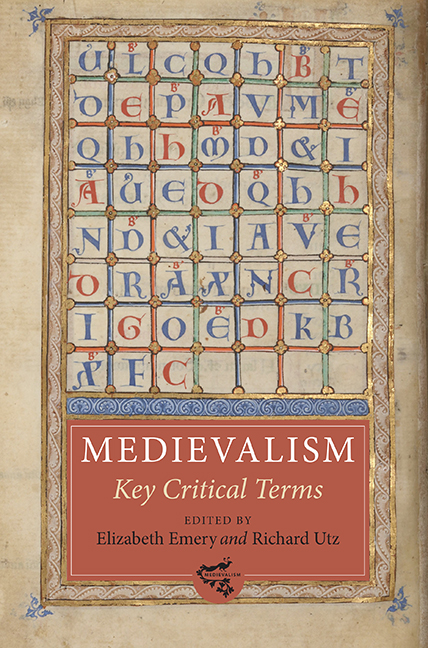Book contents
- Frontmatter
- Dedication
- Contents
- List of Illustrations
- List of Contributors
- Making Medievalism: A Critical Overview
- 1 Archive
- 2 Authenticity
- 3 Authority
- 4 Christianity
- 5 Co-disciplinarity
- 6 Continuity
- 7 Feast
- 8 Genealogy
- 9 Gesture
- 10 Gothic
- 11 Heresy
- 12 Humor
- 13 Lingua
- 14 Love
- 15 Memory
- 16 Middle
- 17 Modernity
- 18 Monument
- 19 Myth
- 20 Play
- 21 Presentism
- 22 Primitive
- 23 Purity
- 24 Reenactment
- 25 Resonance
- 26 Simulacrum
- 27 Spectacle
- 28 Transfer
- 29 Trauma
- 30 Troubadour
- Index
- Medievalism
20 - Play
Published online by Cambridge University Press: 08 October 2022
- Frontmatter
- Dedication
- Contents
- List of Illustrations
- List of Contributors
- Making Medievalism: A Critical Overview
- 1 Archive
- 2 Authenticity
- 3 Authority
- 4 Christianity
- 5 Co-disciplinarity
- 6 Continuity
- 7 Feast
- 8 Genealogy
- 9 Gesture
- 10 Gothic
- 11 Heresy
- 12 Humor
- 13 Lingua
- 14 Love
- 15 Memory
- 16 Middle
- 17 Modernity
- 18 Monument
- 19 Myth
- 20 Play
- 21 Presentism
- 22 Primitive
- 23 Purity
- 24 Reenactment
- 25 Resonance
- 26 Simulacrum
- 27 Spectacle
- 28 Transfer
- 29 Trauma
- 30 Troubadour
- Index
- Medievalism
Summary
WHEN WE THINK about the Middle Ages, we do not usually think of play. Famously characterized as a “thousand years without a bath” by the nineteenth-century French historian Jules Michelet, the period is imagined as an uninterrupted spectacle of violence and brutality, one in which the ordeals of everyday life preclude anything as frivolous as play. Take, for instance, the opening episode of the Swedish mini-series Arn: the Knight Templar. After the obligatory introductory sequence in which Arn is shown riding down Saracens in the deserts of the twelfth-century Holy Land, the episode shifts to an equally familiar, though in many ways antithetical, version of the medieval: the snowy forests of West Gothia some twenty years earlier. There, the audience discovers a markedly younger Arn playing a spirited game of Folkungs versus Sverkers with his friend Knut. The boys have no sooner begun to play, however, when they are discovered by armed riders who bear them back to their parents’ bleak village. Admonished never again to play in the woods, the boys endure a night of halfunderstood political conversation, and, on the following day, are carted to the courtyard of a nearby church. Caught in an ambush, they watch as Knut's father, King Ericsson, is beheaded. Play is thus constructed as a prerequisite to violence in Arn; it is a fundamentally transgressive activity that lures participants outside the protective confines of civilization and, in doing so, exposes them to a hyper-adult, hyper-traumatic world in which childhood, like everything else, is represented as “serious business.”
By the same token, however, many of these medieval worlds are not imagined as mature or complete, but instead represent the contemporary era in its childhood. This is very much the case with Arn, which is adapted from Jan Guillou's Crusades Trilogy, a series of novels that, according to Sandra Ballif Straubhaar, presents readers with “A Birth Certificate for Sweden.” This is also the case with medievalism in general, which, according to Umberto Eco, often stages a return to the pre-modern in an attempt to diagnose the complexities of the present. It is not surprising, then, that the medieval makes for such fantastic play. A staple of mass culture, it allows participants to stage a return to what is, in essence, a particularly traumatic childhood, yet does not require them to endure the trauma of acting like children.
- Type
- Chapter
- Information
- Medievalism: Key Critical Terms , pp. 173 - 180Publisher: Boydell & BrewerPrint publication year: 2014

